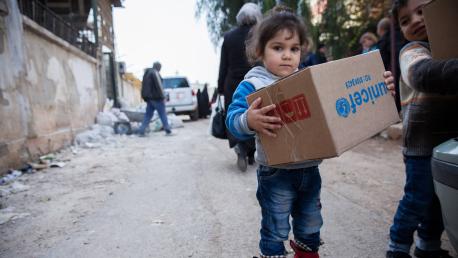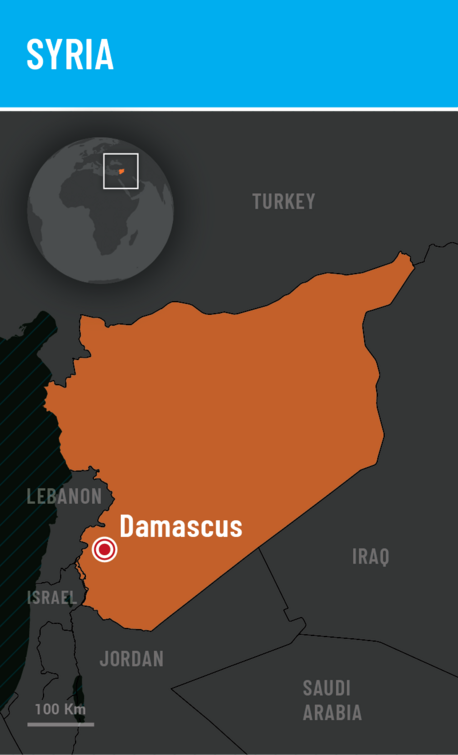
UNICEF in Syria
Far too many children and families in Syria continue to be impacted by a humanitarian crisis that has no end in sight. UNICEF is there, working with partners to meet urgent needs.
Syria: home to one of the most complex emergencies in the world
Children in Syria have been living under the constant threat of violence, deprivation and extreme emotional duress since the start of Syria's civil war in 2011. For many, it is all they know.
Many homes, schools, hospitals and water treatment facilities in Syria are destroyed, and millions of children and families are uprooted by fighting.

The socio-economic impacts of the COVID-19 pandemic hit children and families extremely hard, further eroding access to essential services. Then in February 2023, powerful earthquakes struck both Syria and Türkiye, killing tens of thousands of people and displacing millions more, and the country is still grappling with the aftermath.
A collapsing health care system, lack of access to safe water, poor sanitation and increasing food insecurity have heightened risks of fast-spreading waterborne and vaccine-preventable diseases while also driving increases in malnutrition rates among children.
Millions of Syria's children have been living as refugees in Egypt, Iraq, Jordan, Lebanon and Türkiye for years. For those who remain inside the country, displacement, hardship and fear is a way of life.
A worsening economic crisis leaves families struggling to afford food and other basics while contributing to the normalization of gender-based violence and child exploitation. Around 90 percent of families in Syria live in poverty — many of them resorting to negative coping mechanisms.
An entire generation of children has missed out on at least some education. Nearly half of the 5.5 million school-aged children — some 2.4 million children aged 5 to 17 — remain out of school.
How UNICEF helps children in Syria
More than two-thirds of the population of Syria, including some 7.5 million children, require humanitarian assistance.
UNICEF is there, delivering support and protection.
In 2023, UNICEF reached 15.8 million people, including 10 million children, with essential services and supplies across Syria. Of those reached, 5.6 million, including 3.2 million children, had been affected by the earthquakes.
UNICEF continues to work with partners in Syria to:
- improve access to safe drinking water and sanitation services, distribute hygiene kits and promote safe hygiene practices
- reach millions of children with essential nutrition services, while strengthening malnutrition prevention
- vaccinate children against measles, polio and other preventable diseases, including those living in hard-to-reach areas through mobile teams, while also strengthening infection prevention and control at the community level
- help out-of-school children get back to learning and to catch up on their education
- providing mental health and psychosocial support activities to hundreds of thousands of children and caregivers in need
- provide specialized services for survivors of violence, exploitation and abuse
- expand social protection for the poorest families through cash transfers
- expand life-skills programs, vocational education and entrepreneurship training for adolescents and young people
Syria's children "need a long-term peaceful solution to the crisis, but we cannot just wait for that to happen," Adele Khodr, UNICEF regional director for the Middle East and North Africa, said in March 2024, on the 13th anniversary of the start of the conflict. "In the meantime, it is critical to ensure that children and families not only have access to basic services, but also that we are equipping children with the skills to build their own futures."
The problem, Khodr noted, is that humanitarian funding has dropped to an all-time low — both inside Syria itself and for Syrians in neighboring countries. “Continued support from the international community is critical for restoring systems to deliver essential basic social services, like education, water and sanitation, health, nutrition, child and social protection, ensuring that no child in Syria is left behind.”
A closer look: How UNICEF is supporting children's education, mental health and protection in Syria
Having grown up amid violence, displacement and loss in rural Aleppo, Kinda, 7, below, far left, and her siblings are picking up the pieces of their lives — catching up on their learning at a UNICEF-supported school, receiving psychosocial support and getting educated about the dangers of land mines. Watch the video:
Support children in need. 100 percent of your gift is tax-deductible.